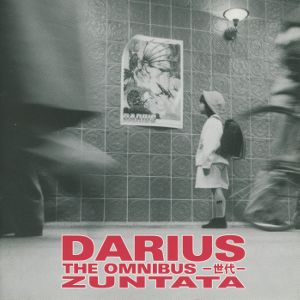Darius the Omnibus -Generation-
 |
Album Title: Darius the Omnibus -Generation- |
| Record Label: Zuntata Records |
|
| Catalog No.: ZTTL-0008 |
|
| Release Date: March 28, 1997 |
|
| Purchase: Download on iTunes |
Overview
Hisayoshi Ogura’s soundtracks for the Darius series were highly influential for their time with their avant-garde stylings and unforgettable hooks. Ten years after the release of the first game, Taito’s in-house record label decided to commemorate the series’ music with an arranged album. Darius the Omnibus is an arrange album for the games Darius and Darius II featuring arrangements from members of ZUNTATA at the time.
Body
“Captain Neo,” from Darius is arranged by Tamayo Kawamoto, known for her work on the Rayforce series when she was part of ZUNTATA. This arrangement is quite intriguing. It opens up with some sampled noises and a countdown before moving into the arrangement proper. The arrangement itself, however, is very similar to something you’d hear in an espionage film. It has a very sneaky, yet action-oriented, sound. The jazzy drums, the keyboard work, especially the solos, and the pounding piano accompaniment makes for an interesting arrangement. Kawamoto’s other arrangement is “Chaos,” also from Darius. This arrangement is quite eerie in nature. The majority of the arrangement is in a similar vein as the original. It’s extremely ambient and features some mechanical and more spacey effects for the majority of the arrangement, such as trains chugging along on a railroad track, some industrial synth, and of course, haunting, distorted operatic vocals. For the most part, it’s a hauntingly beautiful arrangement with some chaotic sections dominated by a variety of synth work, but at the same time, one might find the lack of melodic focus a bit off-putting, if that is what they look for in music.
“Inorganic Beat,” from Darius, is arranged by Jet de Go’s Shuichiro Nakazawa. This arrangement features quite a groovy sound with plenty of funky bass line riffs, some disco-like keyboard work, some distorted vocaloid work, and some pretty neat percussion as well. In the end, it’s a very mellow, comparatively, take on the original theme. I don’t think it’s the best arrangement on the album, but it does help diversify the offers. Nakazawa’s second arrangement, “Cosmic Air Way,” also from Darius¸ is more of a bubbly techno style arrangement. I really like the beats incorporated. They aren’t too invasive and they really accentuate the sugary and futuristic synthesizer melody lines. It’s definitely Nakazawa’s better arrangement on the album.
One of the most beautiful arrangements on the album belongs to Yasuhisa Watanabe’s rendition of “The Sea” from Darius. The Senko no Ronde composer’s arrangement definitely takes on an aquatic atmosphere, with beautiful crystalline synth lines layered with exotic percussion samples. As the arrangement progresses, a haunting atmosphere develops that features mysterious piano samples, more exotic percussion, some marching vocal and sound effect samples, and some ethereal vocal and synth work. This ultimate serves as the bridge for the climax of the arrangement, which features some exotic, African sounding, vocal work, combined with some choral chanting, and militaristic marching sound effects that serve as percussion. Throw in some sitar work and you have a smorgasbord of worldly sounds. Watanabe’s second arrangement, “Olga Breeze,” from Darius II, is more upbeat in nature. It has a carefree kind of sound and conjures up images of flying through the clouds. I do miss the inclusion of the spoken voice samples that the original opened up with, but the music is what’s really important. Watanabe incorporates some slick bass lines, some fantastic synth manipulation, and really manages to capture that breezy feeling.
“Cynthia,” from Darius II, is handled by Densha de Go’s Norihiro Furukawa. Delicate strings and harp, militaristic percussion, beautiful woodwind sections, powerful brass passages, and exquisite harmonies among them all really make this theme a winner. In fact, if I didn’t know any better, I could have easily thought this was from an RPG. Furukawa really managed to transform the original into a lush orchestral feast for the ears and, although it isn’t the most complex orchestral theme ever composed or arranged, it still manages to stand on its own. “Muse Valley,” also from Darius II, is Furukawa’s second arrangement on the album. This is probably my favorite arrangement on the entire album because of how exquisitely he manages to transform the original. Hauntingly beautiful piano, acoustic guitar, some industrial percussion, equally haunting, ethereal vocals, fleeting woodwind passages, and violin work really help to create a tour de force of warming, playful, and mysterious atmospheres.
The last arranger on the album is Masahiko Takaki, of Rastan Saga fame, and he handles a theme from each Darius game on the album. His first arrangement is “Boss 7” from Darius. Used as the final boss theme in the original game, he transforms this one into a fitting, yet very respectful, arrangement. Groovy bass lines, some piano accents, distorted vocal samples, acoustic guitar, whistling, industrial synth, and some steel drums all combine nicely to create a unique fusion of samples. Of course, I really enjoy the variety of manipulated synth also featured in the arrangement. In the end, it’s a very fun arrangement. The closing arrangement on the album,“Free the Love” from Darius II, has a very diverse sound to it. It opens with a doo-wop sound to its arrangement. Performed by Amin, it’s a groovy theme with a lot of keyboard work, some great percussion, and some interesting back-up vocals. As the arrangement progresses, there is definitely a more intense atmosphere featured, complete with rocket takeoff, some bubbly passages, complete with some male and female choral work, and some more pop-like sections. In the end, it’s quite a fun arrangement as well and the inclusion of a vocal track is surprisingly effective. It’s not the strongest arrangement on here, and it may turn a few away, but overall it’s pretty solid.
Summary
The Darius the Omnibus arrange album by former members of ZUNTATA is quite entertaining. There are a variety of styles featured on the soundtrack and each arranger manages to distinguish themselves from the others in terms of style. Whether you are a fan of action-oriented espionage themes, beautiful orchestral work, stylistic fusion, more disco-themed arrangements, or even experimental ones, such as “Chaos,” there is definitely something on this album for everyone. They were able to take the classic Darius themes and upgrade them to a variety of more modern sounding styles and I think it was done quite tastefully. While the physical album is now out-of-print, a digital version can be picked from iTunes, including US stores.
Do you agree with the review and score? Let us know in the comments below!
4
Posted on November 9, 2015 by Don Kotowski. Last modified on November 8, 2015.














